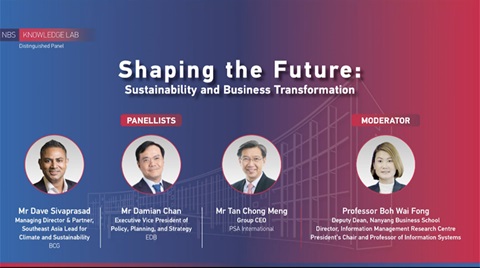Empower Financial Services with Artificial Intelligence
AI has opened up new potential for financial industries to meet consumers’ rising expectations for smarter, safer, and more accessible financial services. Hear from industry experts and researchers from NTU who conduct research in this domain
Artificial Intelligence (AI) adoption has grown substantially in recent years, bringing new potential and implications for the finance industry. On 1 March, Nanyang Technological University Singapore’s (NTU Singapore) Nanyang Business School (NBS) and the Artificial Intelligence Research Institute (AI.R) brought together industry leaders and researchers in a joint symposium to discuss the latest developments for AI in finance. The event, part of the NBS Knowledge Lab Webinar series, was supported by the Joint WeBank-NTU Research Centre on FinTech and NBS Information Management Research Centre (IMARC).
The symposium started with a panel discussion on Singapore’s current landscape, the latest trends, use cases, and best practices concerning AI in finance, among Mr Shadab Taiyabi, President of Singapore FinTech Association; Dr Li Xuchun, Head of AI Development Office (FinTech & Innovation Group), Monetary Authority of Singapore (MAS), and Mr Richard Koh, Founder and CEO of financial start-up M-DAQ, moderated by NBS Assoc Prof Cindy Xin Deng.
Mr Taiyabi observed that Singapore’s FinTech ecosystem has matured considerably, with the number of FinTech-only firms growing from about 100 in 2015 to 1,400 in 2020. While AI has been deployed for various business purposes, he suggested that the most important uses of AI revolve around digital identity verification, credit scoring models, NLP-based chatbots, and fraud detection.
Dr Li followed up by sharing MAS’s four-pillar approach to promoting FinTech in Singapore: building technical platforms such as Veritas and NovA! to promote industry-wide utility; providing support through grants such as the Artificial Intelligence and Data Analytics grant; building up ecosystems through working webinars, sharing session, and tutorials to increase awareness of AI adoption; and developing talent through collaborations with universities and training partners for financial services.
Demonstrating the potential of AI, Mr Koh explained how his company sought a solution to exchange rate volatility in facilitating cross-border business using technology. He remarked that the industry had previously approached the issue from a supply side perspective, which left room for improvement. Through data modelling from a demand side angle, he shared that his company is now able to predict the collective demand of a country for foreign exchange inventory. This, he said, allows the purchase of foreign exchange inventory beforehand and ensures the process is neutral to black swan events.
Opportunities in AI
Looking to the future of AI, Mr Taiyabi noted that digital identity verification and customer onboarding are two areas that are closely researched into. In the investment space, new technology is being tapped in hopes of providing more personalised services for an increasingly affluent mass market. The extent of personalising such services depends on the types of data accessed but a clear framework is needed to manage AI and the issue of bias.
Mr Taiyabi and Mr Koh also agreed that the pandemic effectively forced a larger section of society to move into the digital sphere, which has made credit modelling and scoring more possible.
On the insurance front, Dr Li said that the use of AI in underwriting is increasing and noted that this trend can speed up insurance processing and potentially lower premium costs. He added that AI usage for analytics in capital markets, trading, wealth management, and risk management has been adopted in the US for the past two years but has yet to be picked up in Singapore.
Dr Li suggested that AI could be used to aid decision-making in stock market investments, but the challenge is to accurately estimate the risk tolerance of individual customers. To that, Mr Koh highlighted that digitalisation has unfortunately also seen the rise of highly intelligent scams and that the industry needs to have a plan of action to keep up with these increasingly sophisticated frauds.
Challenges and Bottlenecks
Mr Taiyabi suggested that continued national efforts are required for responsible AI to take place. The FEAT (Fairness, Ethics, Accountability, Transparency) principles introduced by MAS is one example of guidelines for firms using AI but legal structures and certifications at an industry level can also help build trust with customers.
Mr Koh emphasised that more attention should be paid to AI modelling. While AI can be used for a variety of purposes, such as processing routine and high-volume tasks, in-built bias in AI is dangerous and problematic as it can create unfair outcomes. He suggested that industry practitioners and researchers should collaborate closely to ensure ethical concerns are addressed when adopting AI in processes.
Mr Taiyabi pointed out that while companies offering AI solutions and services will want to retain their intellectual property rights, and understandably so, there needs to be some form of checks and balances in place.
All panellists agreed that there is a lack of talent in the market when it comes down to those who are qualified to practise and to train in this field.
Mr Koh added that while big data opens up possibilities, excessive amounts of data in AI can present difficulties in filtering out noise, leading to mismatches between cause and effect. Therefore, using secondary instead of primary data, he said, may be a better approach. He concluded the panel discussion saying that the multi-ethnic nature of our region will also prove to be a challenge due to the varied currencies and languages in use here.
Adopting AI in Banking
Following the panel discussion, Mr Stephen Wang, Director of the Joint WeBank-NTU Research Centre presented his views on AI in banking.
He said there is a lack of big data in FinTech and gave an overview of big data contribution by region and industries. In terms of technology, he shared that there are still limitations in features such as facial recognition, chatbots, machine learning, and voice recognition. Mr Wang also noted that there is resistance to the adoption of FinTech in certain aspects of society, such as the low penetration of digital payment in hawker centres.
He concluded that developing talent in AI requires government encouragement and that regulators play an important role as watchdogs in view of scams.
NTU Faculty Share Latest Research on AI in Finance
Assoc Prof Bo An, from the School of Computer Science and Engineering and Co-Director of AI.R, introduced reinforcement learning in trading and showed how this has proven effective in areas such as portfolio management and algorithmic trading.
From NBS, Asst Prof Jack Tong shared how voicebots, which imitate human voice and conduct natural conversation, have the potential for immense cost savings in call centre operations. Asst Prof Zhu Wenjun reflected on the shortcomings of traditional indemnity-based insurance and suggested instead that neural network-based index insurance can better mitigate basis risk through proper contract design. Finally, Asst Prof Kelvin Law gave an overview of how AI has impacted the jobs of auditors and accountants. His research has shown that there is a higher demand for candidates who possess AI skills, as well as how the demands of these jobs have also changed to require more soft skills.
To view the webinar session, please click here.














/enri-thumbnails/careeropportunities1f0caf1c-a12d-479c-be7c-3c04e085c617.tmb-mega-menu.jpg?Culture=en&sfvrsn=d7261e3b_1)

/cradle-thumbnails/research-capabilities1516d0ba63aa44f0b4ee77a8c05263b2.tmb-mega-menu.jpg?Culture=en&sfvrsn=1bc94f8_1)

7e6fdc03-9018-4d08-9a98-8a21acbc37ba.tmb-mega-menu.jpg?Culture=en&sfvrsn=7deaf618_1)

.tmb-listing.png?Culture=en&sfvrsn=34ade407_1)




